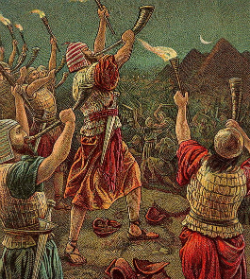X-ray of a revolution
Beginning with a word on context, Seun Kolade takes a look at the biblical story of Gideon, and how his example can inspire Christians today.
“And he said unto them, look to me, and do likewise… it shall be that, as I do, so shall ye do. When I blow the trumpet… then blow ye the trumpets also on every side of the camp…” (Judges 7:17-18 KJV).”

When the scripture, speaking about the people of God, said in Jeremiah 51:20 that “you are my battle axe, and weapons of war, and with you I will break in pieces the nations...”, it was certainly not conjuring an image of graphic violence, or of physical wars, but of things more transcendent and more fundamental in the realm of spiritual realities.
How do we know this? Well, the context in Jeremiah, and the rest of the Scriptures, is very clear, as we are also told that God had chosen Jeremiah and “have this day set you over the nations, and over kingdoms to root out and to pull down, and to destroy... and to build, and to plant” (Jer. 1:10). Jeremiah, as we know, was not a violent man, not even in the face of the most blatant injustices and provocations. It is telling, in fact, that he was once imprisoned for his resolute campaign and counsel against fighting wars (Jeremiah 38:1-6). He was nevertheless a great revolutionary, in the highest and deepest sense of the word.
Now it is true that in the Old Testament there were many descriptions of war, and we shall not here undertake any elaborate theological discussion of the moral dilemma of wars. It suffices to say here that even in these war stories, the underlying message is spiritual and deeper, and often addressed the fundamental issues of justice and God’s benevolent sovereignty over the affairs of men. Thus, in the stampede of the Red Sea we are uplifted not by the destruction of Pharaoh’s chariots, but by the freedom of an oppressed and long-suffering people, and again in the fall of Goliath, the primary encouragement is that righteousness prevails and liberty was won.
God’s unlikely instrument
Let us examine, here, one of the most remarkable stories of revolution that took place in Scripture. Why was it remarkable? It was spearheaded by an unlikely hero called Gideon. He was a man of a very lowly pedigree, and we let him do his own citation: “Behold, my family is poor in Manasseh, and I am the least in my father’s house”.
Manasseh? That’s right. Remember the two sons of Joseph. Manasseh was the older one who was short-changed by their father Jacob when he pronounced blessings on them. Of him we were told that ‘his younger brother shall be greater than he’ (Gen.48:19). Throughout scripture, the Manassites- including their most prominent clan of Gileadites - were hardly ever noted for acts of courage. Deborah once lamented, during a great national crisis, that the Gileadites hid away ‘beyond Jordan’ (Judges 5:17). In fact, in this particular passage, the man Gideon was so afraid of the Midianite oppressors that, rather than thresh wheat in the threshing floor, he had to use the winepress. Even after his first encounter with God, he could not summon the courage to pull down Baal’s altar during the day.
Gideon was an unlikely instrument because he was a fearful man at a time when courage was the utmost requirement; he was a doubting man in a time of great uncertainty when the people need assurance, he was a man of very low profile in a time and culture where positions and honour are given according to rank and status.
But he was God’s choice, and that was all that mattered. In time, then, his cowardice gave way to courage, his doubts to confidence, and by his hands the Lord brought about a great national revival. He started alone, with all the risk pulling down the altar of Baal, and in a short time those who once threatened to kill him became his followers and supporters (Judges 6: 27-34). Spiritual revival was followed by national deliverance, and there was peace and prosperity.
Weak is Strong
We have been talking about Gideon, and the first question that comes to mind is: why would God ‘waste’ his time with a weakling who is evidently short in self-confidence? Waste his time? Far from it! On the contrary, God was going to put on display a remarkable testament to the power of transforming grace.
In the divine scheme of things, there is no place for fatalistic resignation. At Calvary God presents every person with a clean slate. This is the cardinal message of the Christian gospel, that the grace of God is the ultimate force in the entire universe, that by means of it our sins are forgiven, eternal life is given, the love of God shed abroad in our hearts, and the power of God manifested in our lives. This is why our weaknesses, rather than being a hindrance, are in fact an opening for reception of God’s transforming grace, for those who wallow in the illusion of their own strength often exclude themselves from the benefits of God’s grace.
We are told that “by reason of strength shall no man prevail” (1Sam. 2:9), for “it is not of him that wills, or of him that runs, but of God who shows mercy” (Rom. 9: 16). This is the reason why God “chose the foolish things of the world to shame the wise; God chose the weak things of the world to shame the strong.... so that no one may boast in God's presence” (1 Cor. 1: 27-29, NIV).
In the divine scheme of Grace, it is no mere coincidence that Mannaseh was such an ordinary man, once overwhelmed by a sense of weakness and helplessness, until he came in contact with God’s transforming grace. It is not accidental that the great prophet Elijah, so powerful he had to be taken up in chariots of fire, was simply described as “one of the inhabitants of Gilead”, of Manasseh. It is not random that Peter and the other Apostles, by whose hands powerful miracles and great change were wrought, were once men of such lowly pedigree. The force of Grace breaks in pieces the myth of weakness and sets free the man of destiny to fulfil his God-given potential.
Few is powerful
Gideon had 32,000 men at his disposal. In a seemingly bizarre method of recruitment he sent about 99 per cent of them packing, leaving only 300 men. A crazy, suicidal approach it seems for combat with the enemy who came ‘as grasshoppers for multitude, for both they and their camels were without number’ (Judges 6: 5).
Here are the details: 22,000 of them were ‘fearful and afraid ’- they were resistant to the cleansing power of God’s grace. In the business of revolutionary change, the fearful cannot take to the front line. They can infect the ranks with their fearfulness, or take to acts of sabotage or betrayal at the critical moments.
The other 9,700 were sent packing because they were so distracted by their immediate needs that they lost sight of the ultimate goal. When they came to the water, they knelt and lapped the water ‘as a dog lappeth’, too relaxed to focus on the sheer urgency of impending battle. The 300 also drank, but with their hands to their mouths, as people whose minds are focused on the coming battle. The discipline of the few is always to be prized than the chaotic frenzy of the mixed multitude. Indeed, the latter is essentially much an obstacle as the enemy army. More importantly, with God the few carry with them the most potent force in the whole universe. Before them no foe can stand.
Every Man a Trumpet
Every man of Gideon’s 300 had instruments to work with, most notably the trumpet. There is, moreover, a united message ‘the sword of the Lord and of Gideon’. The trumpet is an instrument of proclamation, an equipment of bringing others to awareness, to gather and work for a common goal. In social theory the idea of the critical mass goes like this: if one person stands on the road singing, there is a chance that a few people will stop to watch. If one becomes two and two multiplies to hundreds, surely multitudes will gather to watch the spectacle.
Every one of us has been given a trumpet as we hold the line in our church, in our work place, in our neighbourhood. It could be as pastor, a teacher, a nurse, a politician, an office worker. Gideon’s men were divided into companies, to make sure the collective trumpet for change reach far and wide. They stuck to the message, so must we. The message is for truth and righteousness to rain and reign across the whole spectrum of our spiritual, social, and political life. We must blow… and the message must ring from the business offices in London to the busy streets of Manchester and Glasgow. We must ‘cry aloud, spare not’, lift up our ‘voice like a trumpet’, and show the ‘people their transgressions’ (Isa.58:1). The message is to the ‘kings and princes’ of the land (Jer.1:18). It is to the priests. It is also to the people of the land- against their corruption and self-centredness.
Every man in his place
“And they stood every man in his place round about the camp: and all the host ran, and cried, and fled” (Judges 7:21).
Yes, Christian believers must stand every man in his or her place, as a writer, a preacher, a teacher, a banker, a lawyer, a doctor, etc. We should not be rattled by the noise and movement of the enemy host. Ultimately, they’ll run, they’ll give way. We must stand our ground, in the office, in the neighbourhood, in the church, in the political arena, in the defense of the truth and manifestation of the transforming message of God’s amazing love, for a world that ‘lies under the sway of the evil one’ (1 John 5: 19).
 Seun Kolade is a member of Ilford High Road Baptist Church in Essex, where he is involved in teaching and outreach ministries, in addition to diaconate responsibilities.
Seun Kolade is a member of Ilford High Road Baptist Church in Essex, where he is involved in teaching and outreach ministries, in addition to diaconate responsibilities.
Picture: Gideon and His Three Hundred; as in Judges 7:9-23; illustration from a Bible card published by the Providence Lithograph Company (Wikimedia Commons)
Seun Kolade, 27/09/2013